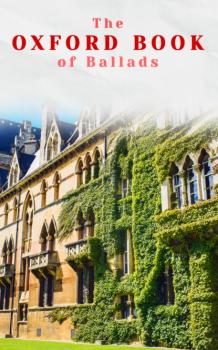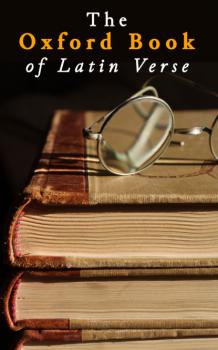ТОП просматриваемых книг сайта:
Various Authors
Список книг автора Various AuthorsАннотация
The famous Oxford Book of Ballads is a monumental anthology of poetry in 4 volumes, edited by Arthur Quiller-Couch. Contents: Thomas the Rhymer Tam Lin Sir Cawline Sir Aldingar Cospatrick Willy's Lady The Queen of Elfland's Nourice Lady Isabel and the Elf-Knight The Riddling Knight May Colvin The Wee Wee Man Alison Gross Kemp Owyne The Laily Worm King Orfeo King Henry The Boy and the Mantle King Arthur and King Cornwall The Marriage of Sir Gawain Bonnie Annie Brown Robyn's Confession The Cruel Mother Binnorie The Broomfield Hill Earl Mar's Daughter Proud Lady Margaret Clerk Saunders The Daemon Lover Clerk Colven Young Hunting The Great Silkie of Sule Skerrie The Wife of Usher's Well A Lyke-Wake Dirge The Unquiet Grave BOOK II: Hynd Horn Hynd Etin Erlinton Earl Brand The Douglas Tragedy Glasgerion King Estmere Fair Annie The Lass of Lochroyan Young Bekie Young Beichan Childe Waters Childe Maurice Brown Adam Jellon Grame Little Musgrave and Lady Barnard Lord Ingram and Childe Vyet Fair Janet Old Robin of Portingale Lord Thomas and Fair Annet Rose the Red and White Lily Leesome Brand Babylon Prince Robert Young Andrew The Gay Goshawk Willie's Lyke-Wake Fair Margaret and Sweet William The Twa Brothers The Cruel Brother Edward, Edward Lord Randal The Twa Corbies The Three Ravens BOOK III: The Nut-Brown Maid Fause Foodrage The Fair Flower of Northumberland Young John Lady Maisry Bonny Bee Ho'm Sir Patrick Spens The Lord of Lorn Edom o' Gordon Lamkin Hugh of Lincoln The Heir of Linne Fair Mary of Wallington Young Waters The Queen's Marie The Outlaw Murray Glenlogie Lady Elspat Jamie Douglas Katharine Johnstone Johnie Armstrong Clyde Water Young Benjie Annan Water Rare Willie Drowned in Yarrow The Duke of Gordon's Daughter The Bonny Earl of Murray Bonny George Campbell BOOK IV: Judas St. Stephen and King Herod The Maid and the Palmer The Falcon The Cherry-Tree Carol The Carnal and the Crane Jolly Wat I Saw Three Ships The Twelve Good Joys The Angel Gabriel The Three Kings The Innocents Dives and Lazarus The Holy Well The Seven Virgins…
Аннотация
"A guide book of art, architecture, and historic interests in Pennsylvania" by Various Authors. Published by Good Press. Good Press publishes a wide range of titles that encompasses every genre. From well-known classics & literary fiction and non-fiction to forgotten−or yet undiscovered gems−of world literature, we issue the books that need to be read. Each Good Press edition has been meticulously edited and formatted to boost readability for all e-readers and devices. Our goal is to produce eBooks that are user-friendly and accessible to everyone in a high-quality digital format.
Аннотация
The Oxford Book of Latin Verse is chronological collection of Latin poems and verses edited by British classical scholar H. W. Garrod, Fellow of Merton College, Oxford. Contents: NVMA POMPILIVS Fragments of the Saliar Hymns THE ARVAL BROTHERHOOD Against Plague upon the Harvest ANONYMOUS Charms An Ancient Lullaby Epitaphs of the Scipios L. LIVIVS ANDRONICVS Fragments of the Odyssey Dramatic Fragments CN. NAEVIVS Fragments of the Bellum Poenicum Dramatic Fragments His Own Epitaph T. MACCIVS PLAVTVS His Own Epitaph MARCIVS VATES Precepts Vaticinium Q. ENNIVS The Vision of Ilia Romulus and Remus The Speech of Pyrrhus Character of a Friend of Servilius M. Cornelius Cethegus Caelius resists the Onset of the Istri Toga Cedit Armis Lesser Fragments of the Annals Alcmaeon Andromache Cassandra Telamon Telamon Molestum Otium Medeae Nutrix From the Iphigenia Epitaph for Scipio Africanus The Same Scipio to Ennius His own Epitaph M. PACVVIVS Fortune The Greeks set sail from Troy Genitabile Caelum Speech Womanish Tears His Own Epitaph L. ACCIVS Tarquin's Dream The Argo seen by a Shepherd who has never seen a Ship Shorter Fragments ANONYMOUS Epitaph of Claudia POMPILIVS His Poetical Lineage VALERIVS AEDITVVS The Lamp of Love Q. LVTATIVS CATVLVS Lost: A Heart The Rising Sun of Roscius PORCIVS LICINVS Ignis Homo Est Terence corrupted by his Patrons LAEVIVS From the Erotopaegnia M. FVRIVS BIBACVLVS The Garden of Valerius Cato The Reward of the Scholar ORACVLVM M. TVLLIVS CICERO De Consulatu Suo Marius From the Odyssey From Sophocles From Euripides C. HELVIVS CINNA An Astronomical Poem written upon Mallow Leaves M. TVLLIVS LAVREA Magic Waters in the Garden of Cicero's Villa Q. TVLLIVS CICERO Astronomical Fragment C. IVLIVS CAESAR Terence C. LICINIVS MACER CALVVS Fragments of Epithalamia The Death of Quintilia T. LVCRETIVS CARVS Exordium The Rule of Reason Magna Mater Epicurus and the Fear of Death The Powers of Hell The World's Conquerors Primitive Man Origin of Belief in God C. VALERIVS CATVLLVS A Hymn to Diana Hymen, O Hymenaee Attis Iunia weds with Manlius…
Аннотация
Irish poetry is mainly written in Irish and English, though some is in Scottish Gaelic and some in Hiberno-Latin. The complex interplay between the two main traditions, and between both of them and other poetries in English and Scottish Gaelic, has produced a body of work that is both rich in variety and difficult to categorize. The earliest surviving poems in Irish date back to the 6th century, while the first known poems in English from Ireland date to the 14th century. Although there has always been some cross-fertilization between the two language traditions, an English-language poetry that had absorbed themes and models from Irish did not finally emerge until the 19th century. Table of Contents: Part I: I. Ancient Irish and Scottish II. Ancient Cornish III. Ancient Armorican (Breton) IV. Early Cymric and Medieval Welsh Part II: I. Irish (Modern and Contemporary) II. Scoto-Celtic (Middle Period) III. Modern and Contemporary Scoto-Celtic IV. Contemporary Anglo-Celtic Poets (Wales) V. Contemporary Anglo-Celtic Poets (Manx) VI. Contemporary Anglo-Celtic Poets (Cornish) VII. Modern and Contemporary Breton VIII. The Celtic Fringe Bliss Carman The War-Song of Gamelbar Golden Rowan A Sea Child Ellen Mackay Hutchinson The Quest Moth Song June Hugh M'Culloch Scent o' Pines Duncan Campbell Scott The Reed-Player Thomas D'Arcy M'CGee The Celtic Cross Mary C. G. Byron The Tryst of the Night Alice E. Gillington The Doom-Bar The Seven Whistlers Shane Leslie Requiem Padraic Colum An Old Woman of the Roads A Cradle Song James Stephens The Coolun The Clouds Eleanor Hull The Old Woman of Beare Thomas Macdonagh From a «Litany of Beauty» Seosamh Maccathmhaoil I will go with my Father a-ploughing A Northern Love Song Patrick MacGill Fairy Workers Francis Ledwidge The Shadow People My Mother Gordon Bottomley Lyric from «The Crier by Night» James H. Cousins The Quest Padraic H. Pearse The Fool Lord Dunsany The Return of Song Kenneth Macleod Dance to your Shadow Sea Longing The Reiving Ship Marjory Kennedy-Fraser Land of Heart's Desire…
Аннотация
This collection includes the Oxford poetry selection for the year from 1917, 1919, 1920 and 1921: Oxford Poetry, 1917: P. BLOOMFIELD (Balliol) Second-Best M. ST. CLARE BYRNE (Somerville) Favete Linguis J. E. A. CARVER (Magdalen) Tintagil EUGENE PARKER CHASE (Magdalen) On Sussex Downs W. R. CHILDE (Magdalen) The Last Abbot of Gloucester The Gothic Rose GERALD H. CROW (Hertford) Ad Dominam Suam Mariam Virginem Desiderio Desideravi Humility D. N. DALGLISH (St. Hilda's) Otmoor E. C. DICKINSON (Non-Coll.) A Child's Voice River Song E. R. DODDS (University) Measure C. J. DRUCE (Non-Coll.) The Meeting T. W. EARP (Exeter) The Canal Solitude… Oxford Poetry, 1919: H. M. ANDREWS (New College) Song T. H. W. ARMSTRONG (Keble) Heritage Watching Loneliness P. BLOOMFIELD (Balliol) Twilight VERA M. BRITTAIN (Somerville) To a V.C. H. I. BURT (Balliol) From their Dust F. W. BUTLER-THWING (New College) The Tramp-Ship Pilot and Clouds E. P. CHASE (Magdalen) Seven Mists "I am clothed with Furtive Light" W. R. CHILDE (Magdalen) Les Hallucinés E. A. C. CLARKE (Keble) Flowers L. M. COOPER (Lady Margaret Hall) Lines for a Flyleaf of Herodotus Crusoe was a Vagabond ERIC DICKINSON (Exeter) The Garden… Oxford Poetry, 1920: EDMUND BLUNDEN (Queen's) Sheet Lightning Forefathers G. H. BONNER (Magdalen) Sonnet VERA M. BRITTAIN (Somerville) Boar's Hill, October, 1919 The Lament of the Demobilized Daphne G. A. FIELDING BUCKNALL (Exeter) Unto Dust ROY CAMPBELL (Merton) The Porpoise Bongwi's Theology ERIC DICKINSON (Exeter) Three Sonnets LOUIS GOLDING (Queen's) The Moon-Clock Cold Branch in the Black Air I Seek a Wild Star ROBERT GRAVES (St. John's) Morning Phœnix L. P. HARTLEY (Balliol) Candlemas B. HIGGINS (B.N.C.) One Soldier Oxford Poetry, 1921: F. N. W. BATESON (Trinity) Trespassers EDMUND BLUNDEN (Queen's) The Watermill The Scythe That Time is Gone The South-West Wind The Canal The March Bee LOUIS GOLDING (Queen's) Ploughman at the Plough Portrait of an Artist Shepherd singing Ragtime Ghosts Gathering ROBERT GRAVES (St John's) Cynics and Romantics…
Аннотация
The Oxford Book of English Verse, 1250–1900 is an anthology of English poetry, edited by Arthur Quiller-Couch, that had a very substantial influence on popular taste and perception of poetry and remained the leading general anthology of English verse throughout the 20th century. Poets included in the collections are: Geoffrey Chaucer Alexander Pope Christopher Marlowe Edmund Spenser Elizabeth Barrett Browning Emily Brontë Robert Browning Robert Burns Percy Bysshe Shelley Samuel Taylor Coleridge John Milton John Ruskin John Keats William Butler Yeats William Makepeace Thackeray William Wordsworth Sir Thomas Wyatt Thomas Love Peacock George Meredith Lord Tennyson John Bunyan John Dryden Sir Walter Scott Robert Louis Stevenson Rudyard Kipling George MacDonald William Blake James Joyce Emily Dickinson Walt Whitman And many more.
Аннотация
The book «West Port Murders» reveals the horrible chain of events during ten months in 1828 in Edinburgh, Scotland. Due to the rising interest in dissection and anatomy in Edinburg and significant sums of money paid for human corpses by doctors, two men, William Burke and William Hare, committed a series of killings, which became known as West Port or Burke and Hare murders. Their interest in murders rose after they sold the dead body of their lodger to a local doctor, Robert Knox, and received a solid amount of money for that. After another lodger in their house got a fever, they killed her in fear that her disease would deter other people from renting rooms in their house. They sold her body to the same doctor and went on with 15 more murders until the police finally caught them. This book contains the complete account of the murders committed by Burke and his associates and all the extraordinary circumstances connected with them. It also includes the description of Burke's trial.
Аннотация
This collection of regency romance novels consists of the most loved books of all time, including Pride and Prejudice by Jane Austen, Vanity Fair by William Makepeace, The Black Moth by Georgette Heyer and many more such stories, which paved the way for modern romance books, TV series and movies: Pride and Prejudice (Jane Austen) Sense and Sensibility (Jane Austen) Mansfield Park (Jane Austen) Emma (Jane Austen) Persuasion (Jane Austen) Powder and Patch (Georgette Heyer) The Black Moth (Georgette Heyer) These Old Shades (Georgette Heyer) Evelina (Fanny Burney) Cecilia (Fanny Burney) Camilla (Fanny Burney) The Wanderer (Fanny Burney) Mary: A Fiction (Mary Wollstonecraft) Paul and Virginia (Bernardin de Saint-Pierre) First Love (Mrs. Loudon) Dilemmas of Pride (Mrs. Loudon) The Yellow Poppy (D. K. Broster) Mr. Rowl (D. K. Broster) The Battle of the Strong (Gilbert Parker) Malcolm (George MacDonald) Lorna Doone (R.D. Blackmore) First Love (Ivan Turgenev) A Dash for a Throne (Arthur W. Marchmont) The Wild Irish Girl (Lady Sydney Morgan) Sophia (Stanley John Weyman) Belinda (Maria Edgeworth) Patronage (Maria Edgeworth) Fantomina (Eliza Haywood) The History of Miss Betsy Thoughtless (Eliza Haywood) The Fortunate Foundlings (Eliza Haywood) Memoirs of Emma Courtney (Mary Hays) Dangerous Liaisons (Pierre Choderlos de Laclos) Miss Marjoribanks (Mrs. Olifant) Phoebe, Junior (Mrs. Olifant) Vanity Fair (William Makepeace Thackeray) Pamela (Samuel Richardson) Anti-Pamela (Eliza Haywood) Shamela (Henry Fielding) Olinda's Adventures (Catharine Trotter Cockburn) The Charterhouse of Parma (Stendhal) The Sorrows of Young Werther (Goethe)
Аннотация
Talmud is the central text of Rabbinic Judaism and the primary source of Jewish religious law (halakha) and Jewish theology. The term «Talmud» normally refers to the collection of writings named specifically the Babylonian Talmud (Talmud Bavli). It may also traditionally be called Shas, a Hebrew abbreviation of shisha sedarim, or the «six orders» of the Mishnah. The Talmud consists of tractates and contains the teachings and opinions of thousands of rabbis (dating from before the Common Era through to the fifth century) on a variety of subjects, including halakha, Jewish ethics, philosophy, customs, history, and folklore, and many other topics. The Talmud is the basis for all codes of Jewish law and is widely quoted in rabbinic literature. This version is the new edition of the Babylonian Talmud with original text edited, corrected, formulated and translated into English by Michael L. Rodkinson. Table of Contents Book 1: Tract Sabbath Book 2: Tracts Erubin, Shekalim, Rosh Hashana Book 3: Tracts Pesachim, Yomah and Hagiga Book 4: Tracts Betzah, Succah, Moed Katan, Taanith, Megilla and Ebel Rabbathi or Semahoth Book 5: Tracts Aboth, Derech Eretz-Rabba, Derech Eretz-Zuta, and Baba Kama (First Gate) Book 6: Tract Baba Kama (First Gate), Part II and Tract Baba Metzia (Middle Gate) Book 7: Tract Baba Bathra (Last Gate) Book 8: Tract Sanhedrin: Section Jurisprudence (Damages) Book 9: Tracts Maccoth, Shebuoth, Eduyoth, Abuda Zara, and Horioth Book 10: History of the Talmud
Аннотация
This work gives a unique opportunity to dive into the world of ancient British poetry and legends. Here, a reader will find the primary sources for the epic stories about Gilderoy, Winifred, Bryan, Sir Cauline, King Estmere, Sir Guy, King Arthur, the Fairy Queen, and many more. A collection in three volumes contains numerous works by famous and anonymous authors adapted to modern English. The significance of this work is apparent. It was the first collection of ballades in English poetry of this size. It influenced the Romantic movement greatly and contributed to the revivals of ballades in England. Robert Burns, Wordsworth, and Coleridge based their lyric poems on this collection. Although, this work could never see the light of the day. Back in the 18th century, Irish Bishop Thomas Percy saved a manuscript almost set afire by a housemaid. It was an ancient collection of ballades, which inspired the Bishop for further research. Today, it's not just an important historical book; it is also a great source of study materials as well as an exciting read for anyone fond of history and British poetry.










